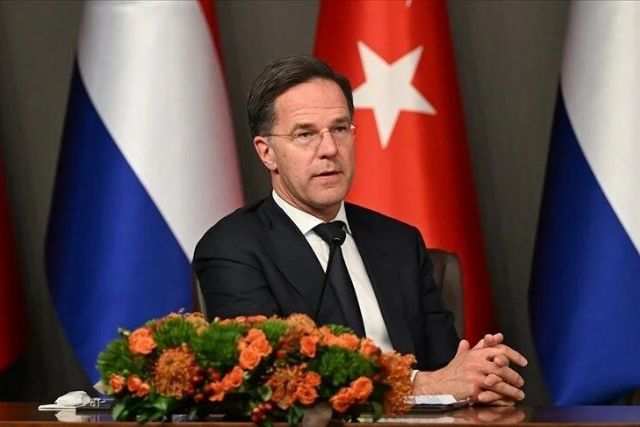OPINION - Did the Armenian lobby take over Disney+?
In response to the lobby that continues to exist as a hate community against Türkiye, more prudent decisions are expected from international companies such as Disney

The author is a Ph.D. Candidate in the Department of Politics at the University of York whose work focuses on post-Soviet politics and Central Asia
ISTANBUL
The prime minister of Armenia, Nikol Pashinyan, announced in recent months that the government had stopped their attempts to impose Armenian claims on the 1915 events in the international arena and that they expect the same attitude from the Armenian diaspora. Especially after the Nagorno-Karabakh conflict in 2020, a softening and normalization process had begun between Armenia with Türkiye and Azerbaijan. Positive developments in relations progressed until Pashinyan's attendance at President Recep Tayyip Erdogan's inauguration ceremony this June. The positive views of the parties towards the current status quo in the region gave hope for regional peace. However, the debates triggered by the Armenian lobby's propaganda against the Ataturk TV series further revealed the distinction between Armenia and the Armenian diaspora.
Disney's digital streaming platform, Disney+, made a strong impression on Turkish audiences when it launched in Türkiye in June 2022, by announcing the production of an Ataturk TV series, which resulted in a significant bump in subscribers. However, in recent months, the Armenian National Committee of America (ANCA) openly insulted Mustafa Kemal Ataturk, the founder of the Republic of Türkiye, on social media and initiated a campaign against the platform due to the production of the series. Shortly after this campaign, local Turkish productions were removed from the website, leading to speculation the Ataturk series had been cancelled. In response to this backlash, the company clarified that the series was not cancelled and would be shown on Fox TV on Oct. 29 and then in movie theaters.
Disney+'s decision to broadcast the Ataturk series exclusively on a channel accessible only from Türkiye, rather than on a global platform, has sparked a growing backlash from the Turkish public. In particular, the fact that the decision was taken under pressure from the Armenian lobby roiled the debate. Turkish users took to social media to say they were cancelling their Disney+ subscriptions. Additionally, the Radio and Television Supreme Council (RTÜK) announced that they will investigate the issue and ask Disney to explain itself. Political party representatives also blasted the Armenian lobby over the issue and cautioned Disney+ to reconsider the decision. The ANCA, on the other hand, announced that their campaign was successful, and they were satisfied with the decision taken by Disney.
Armenian lobby
The Armenian diaspora exerts significant influence in France and Russia, but is considered most organized and effective in the United States due to the opportunities provided by the American political system. The Armenian lobby has seen an increase in its political influence in America since the 1970s, and its presence became more pronounced in 1984 when all Armenian organizations in America united under the Armenian Assembly of America. Their population of approximately 700,000 in the U.S., characterized as a community belonging to Western religion and culture, has allowed them to gain support from American society. Described as a well-organized structure, the Armenian lobby has consistently maintained strong relations with the U.S. Congress.
Though their financial resources and population in America are limited, Armenians have compensated for this situation. Especially their concentration in specific electoral districts and active involvement in election campaigns have turned the Armenian diaspora into an influential community in the U.S. The significant increase in the number of Armenian organizations and the various activities they organized increased the visibility of the Armenian lobby in the country in the early 2000s. Armenian lobbies in the United States seek to contribute to the development of Armenian culture, fostering cultural, historical, and religious ties between the Armenian community and American society, enabling Armenian-Americans' full political participation in the political system, and actively engaging in domestic politics. The main purpose of this lobby is to reinforce the Armenian claims on the 1915 events and to influence the U.S. politicians and the public to take decisions against Türkiye's interests.
Armenia vs. Armenian lobby
As a result of the successful policy followed by Azerbaijan and Türkiye in the Second Nagorno-Karabakh War, which started in September 2020 and lasted for 44 days, the Armenian occupation of the region came to an end. While Azerbaijan liberated its lands that had been occupied for 28 years, the status quo in the South Caucasus also changed. Following these developments, the softening and normalization process between Armenia with Türkiye and Azerbaijan started and continues. So why does the Armenian lobby take such an attitude in such a peace and diplomacy process that started years later?
With a population of 3 million and a troubled economy, Armenia has played an occupying role in Karabakh for years. Although Türkiye has taken steps towards normalization and peace with Armenia, the Armenian diaspora has always been an obstacle. Despite the hardships faced by the Armenian people, the Armenian warlords in the West wanted the war in Karabakh to continue and the hostility towards Türkiye and Azerbaijan to increase. The Diaspora Ministry in Armenia has been a tool of pressure for Armenian politicians. The Armenian diaspora, which is far from both historical and regional realities, has set the course of Armenian politics for many years. Pashinyan's efforts to distance the diaspora from Armenian politics by following a more realistic policy in recent years led to friction between these two sides.
Mustafa Kemal Ataturk, the founder of the Republic of Türkiye, is a hero and significant value for Turkish society. The backlash from the public and government officials after Disney's decision clearly show this. Therefore, in response to the lobby that continues to exist as a hate community against Türkiye, more prudent decisions are expected from international companies such as Disney.
*Opinions expressed in this article are the author's own and do not necessarily reflect the editorial policy of Anadolu.





